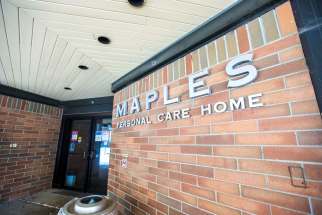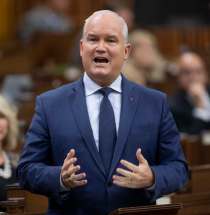Province’s mistakes a contributing factor in Manitobans’ misbehaviour
Read this article for free:
or
Already have an account? Log in here »
To continue reading, please subscribe:
Monthly Digital Subscription
$0 for the first 4 weeks*
- Enjoy unlimited reading on winnipegfreepress.com
- Read the E-Edition, our digital replica newspaper
- Access News Break, our award-winning app
- Play interactive puzzles
*No charge for 4 weeks then price increases to the regular rate of $19.00 plus GST every four weeks. Offer available to new and qualified returning subscribers only. Cancel any time.
Monthly Digital Subscription
$4.75/week*
- Enjoy unlimited reading on winnipegfreepress.com
- Read the E-Edition, our digital replica newspaper
- Access News Break, our award-winning app
- Play interactive puzzles
*Billed as $19 plus GST every four weeks. Cancel any time.
To continue reading, please subscribe:
Add Free Press access to your Brandon Sun subscription for only an additional
$1 for the first 4 weeks*
*Your next subscription payment will increase by $1.00 and you will be charged $16.99 plus GST for four weeks. After four weeks, your payment will increase to $23.99 plus GST every four weeks.
Read unlimited articles for free today:
or
Already have an account? Log in here »
Hey there, time traveller!
This article was published 27/10/2020 (1869 days ago), so information in it may no longer be current.
Premier Brian Pallister is certainly not wrong when he alleged this week that some Manitobans are fuelling a second, more severe surge of COVID-19 cases by doing "dumb things that are endangering all of us."
But, he is also wrong when he implies that he and his government are not among those doing the dumb things.
By this point in the recent surge of new infections and deaths, it seems abundantly clear that the worst parts of the government’s pandemic response are encouraging some of the worst behaviour among members of the general public.
![]()
That is certainly a conclusion that Pallister would prefer Manitobans do not reach. The premier’s angry father rant against reckless Manitobans did not contain even a hint of responsibility for the role his government may have played in this seemingly unstoppable escalation in COVID-19 infections.
For the record, Pallister is correct when he suggests that individuals are making bad decisions right now. We all need to carefully consider whether what we are doing, and where we are doing it, is endangering other people. Not enough of us are stopping to think about whether some of the most mundane scenarios we face every day may be contributing to the current crisis.
At Monday’s pandemic briefing, chief medical health officer Dr. Brent Roussin described a litany of these mundane scenarios: people who had been exposed to the virus attending faith-based gatherings and then visiting a personal-care home; someone leaving work because they were ill but making a shopping run before returning home; people who have been diagnosed with COVID-19 hosting a social gathering in their homes; people who have been exposed or tested positive isolating at home but not isolating from their family.
These scenarios explain, in greater detail than previous briefings, how the novel coronavirus is spreading so quickly. One person makes a bad decision, which exposes a group of people that likely contains other people who go on to make other, similar bad decisions. Before you know it, we’re seeing record numbers of daily infections.
Although he didn’t get deeper into these scenarios, we can assume that in addition to going places where they shouldn’t go and meeting with people they shouldn’t meet, these folks were likely not wearing masks or adhering to social-distancing guidelines.
These are all horrendous acts of laziness on the part of the individuals involved. However, many of the Manitobans who are engaged in needlessly reckless behaviour have had some help in the form of a provincial government that has struggled in recent months to provide a pandemic response that was commensurate to the second surge.
Messaging from the province has been, at times, a complete muddle. It was just more than two months ago that Pallister launched a poorly timed advertising campaign encouraging Manitobans to leave their homes and jump-start the economy. The premier eventually amended the campaign, but the false sense of security had already been created.
Similar missteps have undermined the code-orange restrictions. Public health officials have tried to limit risky behaviour in places such as bars and restaurants, but the off-again, on-again, off-again lockdown of beverage rooms has no doubt created some confusion about the magnitude of the risk posed when we socialize in close quarters with people outside our households.
Also adding to the confusion is the constant, baseless claims about how Manitoba is doing better than virtually any other jurisdiction in the country.
![]()
Roussin has been consistent in imploring Manitobans to embrace "the basics" of COVID-19 control. But those messages have been undermined by a relentless public relations campaign from the Pallister government claiming that we’ve outperformed other provinces in all aspects of the pandemic response, from the number of confirmed cases to the economic supports to businesses and individuals.
As pandemic fatigue grows among the populace, that kind of political rhetoric does little to convince citizens to remain vigilant. Nor does the slipshod way the Pallister government has handled COVID-19 testing capacity.
This fall, as cases began to rise in Winnipeg, the health-care system got caught with a signifiant shortage of testing sites, trained staff to administer tests and laboratory capacity. It took weeks of pledges from Pallister and Health Minister Cameron Friesen before new sites were opened.
However, by that time it had become well known that going to get a nasal swab could take hours and that there was always a possibility that you would be turned away. And then, even if you did get tested, you might have to wait days to get results.
The inability to ramp up testing to meet this surge and provide results on a more timely basis is not only negligent in and of itself, it has likely discouraged some people from even attempting to get tested. That means more people who have been exposed choosing to go on with their lives in a relatively normal fashion and, in the process, spreading the virus.
Manitoba in general, and Winnipeg in particular, are facing their greatest COVID-19 challenge right now. We are all hoping against hope that we can to turn back this surge without having to go into complete lockdown again.
But that is clearly going to require everyone — from individual citizens to the leaders of the provincial government — to demonstrate a level of intelligence that has recently been in short supply.
dan.lett@freepress.mb.ca

Born and raised in and around Toronto, Dan Lett came to Winnipeg in 1986, less than a year out of journalism school with a lifelong dream to be a newspaper reporter.
Our newsroom depends on a growing audience of readers to power our journalism. If you are not a paid reader, please consider becoming a subscriber.
Our newsroom depends on its audience of readers to power our journalism. Thank you for your support.
History
Updated on Tuesday, October 27, 2020 8:06 PM CDT: Fixes typo.






